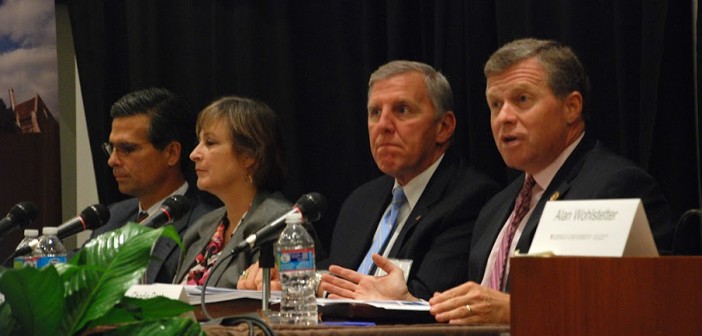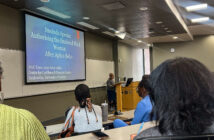Lehigh University’s College of Business and Economics hosted a symposium titled, “The Crisis in State and Local Government Finance,” to address the several pressing fiscal and budgetary issues facing local policymakers.
The day opened with the speech “The Fiscal Consequences of Pennsylvania’s Aging Population,” in which Robert Strauss, a professor of Economics at Carnegie Mellon University, and Yunni Deng, an analyst with the International Monetary Fund, addressed challenges related to the state’s aging demographics.
Strauss predicts that the government’s senior healthcare spending will jump from $4 billion to $7 billion by the year 2025. Such a dramatic rise in spending will certainly lead to a budget deficit if the problem is not addressed. The proposed solutions include cutting offered services and taxing retirement income, neither of which is easy for a society to impose upon its citizens, but a necessity in order for the state to remain solvent in the near future.
Karen Chen, ’15, believes that although it is not ideal for anyone to have to increase taxes on a certain demographic, the state must do what is necessary to raise revenue.
“There will be a lot of opposition to a tax hike, but at some point the tough decision needs to be made,” Chen said.
The state’s aging crisis was followed by a panel discussion titled “Fiscal Challenges Facing State Government.” Panelists included state Sen. John Blake, Sharon Ward of Pennsylvania’s Budget and Policy Center, Dan Meuser of Pennsylvania’s Department of Revenue and U.S. Congressman Charlie Dent. The panel, moderated by Allen Wohlstetter, discussed alternative ways in which revenue could be generated.
Immediately following the discussion came another panel in which Lehigh University faculty gave their research perspectives on the matter.
Robert Inman, an economics professor from the University of Pennsylvania, then gave a speech, “Financing Cities: An Agenda for Growth,” which was followed by the day’s final panel discussion “Fiscal Challenges Facing Local Government.” This panel featured Bethlehem’s mayor Robert Donchez; Joseph Roy, the Superintendent of Bethlehem’s school district; Julio Guridy, president of Allentown’s city council; and Don Cunningham, CEO of the Lehigh Valley Economic Development Corporation.
Donchez opened with the bleak reality that Bethlehem’s annual budget for 2015 includes a $6 million deficit.
“I knew the city was struggling financially, but I had no idea the situation was so severe,” said Vinicius Aguiar, ’16, an IDEAS major, who added that his hometown of Everett, Massachusetts, is faced with similar financial difficulties. The idea of the privatization of services, such as water and sewer, as well as liquor stores, are serious options to free up government capital.
Matthew Dugan, ’17, agrees that, as a whole, the private sector is much more efficient at managing enterprises than the government, adding that “privatizing liquor stores will lead to increased tax revenue and will help chip away at the deficit.”
Guridy took the approach that raising taxes on Allentown residents was not the preferred course of action. Instead, he will seek to attract more businesses into the city, which will, in turn, raise city tax revenues.
“Allentown already has higher property tax rates than its neighbors,” he said, and he fears any additional tax hikes will result in an exodus of people from the city.






Comment policy
Comments posted to The Brown and White website are reviewed by a moderator before being approved. Incendiary speech or harassing language, including comments targeted at individuals, may be deemed unacceptable and not published. Spam and other soliciting will also be declined.
The Brown and White also reserves the right to not publish entirely anonymous comments.